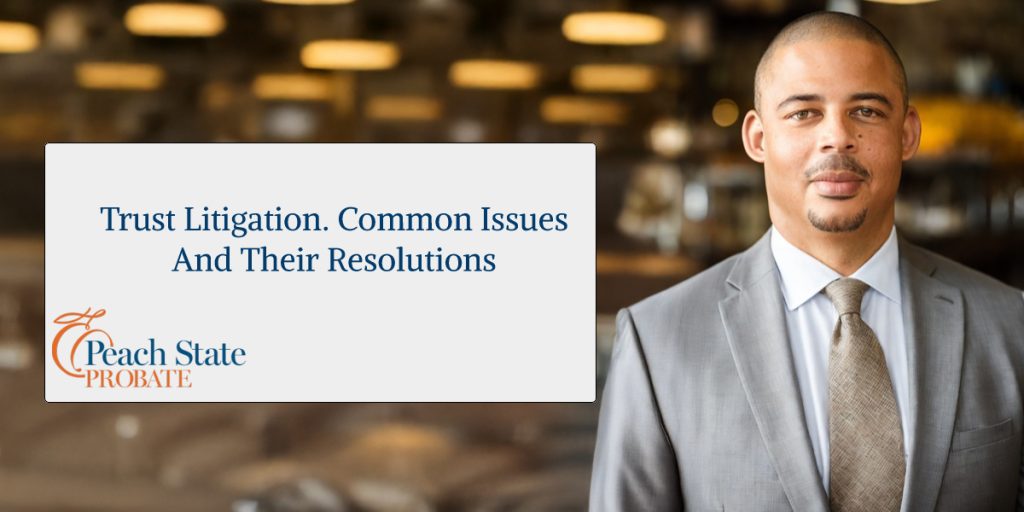## Understanding Trust Litigation: Common Issues and Their Resolutions
Trust litigation, a specialized area of probate law, encompasses the legal disputes that arise regarding the formulation, administration, and enforcement of trusts. Trusts are instruments used for estate planning and asset management, enabling individuals to designate how their assets should be distributed upon their passing. While they serve an essential role in estate management, conflicts can emerge, leading to trust litigation. This can involve disputes over the validity of a trust, claims against the trust’s assets, or disagreements among beneficiaries about the interpretation of the trust terms.
As trust disputes often center on emotional issues like inheritance and family dynamics, they can be particularly challenging. Understanding what constitutes trust litigation is essential for anyone involved in asset management or estate planning. The term encompasses various legal actions, including contests to a trust’s validity, breach of fiduciary duty claims, and disputes over trustee actions. Knowing what these disputes entail helps individuals and families better prepare for potential conflicts and take appropriate steps to resolve them.
The nuances of trust litigation extend beyond mere legal definitions; they embody real-life challenges and complex personal relationships. Individuals involved in trust disputes must navigate not only the legal implications but also the emotional ramifications. An experienced attorney can provide crucial guidance and assistance in managing these sensitive issues, ensuring that the parties involved approach the situation with the necessary knowledge and strategy.
## The Importance of Trust Litigation Awareness
Understanding trust litigation is not just a matter for legal professionals; it’s crucial for anyone involved in estate planning or management. Estate planning is inherently tied to personal relationships and the distribution of assets among family members. Disputes over trusts often stem from misunderstandings, lack of communication, or disagreements about the intentions of the trust creator. By being aware of the common issues and complexities surrounding trust litigation, individuals can make informed decisions that minimize disputes and misunderstandings.
Raising awareness about trust litigation also highlights its significant impact on legacy and family dynamics. Many families believe conflicts over trusts will not affect them, yet statistics show that these disputes are common. Grasping the potential issues that could lead to trust litigation encourages proactive planning and communication about estate matters. Individuals can avoid many pitfalls by discussing their intentions and ensuring that all parties involved understand the terms and conditions of the trust.
Moreover, awareness about this area of law provides a stronger foundation for families left to manage their assets after a loved one passes. Education surrounding trust litigation empowers individuals, promoting transparency that can lead to smoother transitions of wealth and legacy. When beneficiaries know what to expect, they can often work collaboratively, reducing the likelihood of litigation.
## Legal Framework and Context of Trust Litigation
The legal framework surrounding trust litigation is grounded in probate law, which varies from state to state. In Georgia, for example, the Uniform Trust Code provides a guideline for how trusts should be administered and the rights of the involved parties. Understanding this framework is vital for accurately navigating any disputes that arise. The laws dictate how trusts are created, what constitutes a breach of fiduciary duty, and how disputes may be resolved through mediation or litigation.
Additionally, trust litigation involves complex interactions between various legal principles, including contract law, property law, and fiduciary duties. A trustee has a legal obligation to manage the trust in the best interest of the beneficiaries, and failure to adhere to this duty could lead to trust litigation. Familiarity with these legal obligations can provide insight into the motivations behind potential disputes and how best to address them.
Judicial interpretations of trust-related statutes also play a significant role in shaping trust litigation outcomes. Courts will often rely on both state laws and prior case rulings to guide their decisions in disputes. Understanding key rulings can offer confidence to parties involved in trust litigation when establishing or contesting trusts. This contextual knowledge is vital for anyone facing disputes and having informed legal representation.
## Real-Life Context: Examples of Trust Litigation
Real-world examples can illuminate the complexities and challenges of trust litigation. A common scenario involves a beneficiary contesting the validity of a trust, claiming the creator lacked mental capacity at the time the trust was established. These cases often hinge on medical records, testimony from family members, and expert evaluations, making them not only complex but also emotionally charged. The resolution of such disputes can take years and require extensive legal resources.
Another frequent issue in trust litigation is related to breaches of fiduciary duties by trustees. This situation can arise if a trustee is found engaging in self-dealing or neglecting their responsibilities, leading to financial losses for beneficiaries. For example, if a trustee fails to manage investments prudently and incurs excessive losses, beneficiaries may initiate litigation against them for breach of fiduciary duty. High-profile cases can serve as cautionary tales for trustees about the potential consequences of neglecting their obligations.
Additionally, the interpretation of ambiguous language within a trust document can spark litigation among beneficiaries. Such disputes often occur when beneficiaries cannot agree on the trust creator’s intent, especially when the language is vague or poorly worded. For instance, a trust may include provisions for distributing “reasonable” amounts to beneficiaries without clearly defining what constitutes a reasonable amount. This lack of clarity can lead to prolonged legal disputes, which can be resolved more efficiently through clear communication and interpretation efforts.
## Practical Steps to Address Trust Litigation
When facing trust litigation, taking proactive steps is essential. The first step is to gather all relevant documents associated with the trust in question. This includes the trust document itself, any amendments, and communication records between parties related to the trust. Having this documentation organized and accessible is vital for any legal consultation and can help clarify the issues at stake.
Once the necessary documents are assembled, engaging in open and honest communication with other parties involved is the next course of action. Discussions may help resolve misunderstandings before escalating to litigation. Mediation is a viable option to explore, as it can provide a less adversarial approach, helping all parties reach a mutually agreeable solution. Open dialogue about concerns can defuse tensions and lead to a collaborative outcome, saving both time and resources.
If disputes persist despite attempts at resolution, consulting a qualified attorney familiar with trust litigation is vital. A legal professional can assess the situation, advise on the potential course of action, and represent you throughout the legal process. Given the complexities involved in trust litigation, specialized legal guidance can make a difference in achieving a favorable outcome.
## Avoiding Common Pitfalls in Trust Litigation
Navigating trust litigation can be fraught with challenges, and avoiding common pitfalls can make a significant difference in the outcome. One major mistake individuals often make is failing to understand the terms of the trust before taking action. Misinterpretation of the trust document could lead to unnecessary litigation or, worse, a negative outcome in court. Parties involved in trust disputes should seek clarification of trust terms with the help of legal counsel to avoid conflict.
Another frequent pitfall is the underestimation of the importance of meticulous record-keeping. Any communication related to the trust, including emails, letters, and meeting notes, should be documented. A lack of documentation can lead to difficulties in substantiating claims or defenses during litigation. Maintaining organized records that reflect all decisions and communications regarding the trust is vital in reinforcing your position.
Finally, acting without legal counsel in trust litigation can be detrimental to your case. Many individuals attempt to navigate disputes independently, believing it will save money or simplify the process. However, trust litigation is often intricate, with specific legal standards and procedural nuances that require professional insight. Relying on legal representation ensures that you understand every facet of the litigation and maximizes your chances of a favorable outcome.
## When to Seek Legal Representation in Trust Litigation
Knowing when to seek legal representation in trust litigation is crucial to protecting your interests. One of the primary indicators that legal representation is necessary is a situation where there is a disagreement among beneficiaries regarding the trust’s provisions. In cases where disputes are escalating or the likelihood of litigation becomes apparent, consulting an attorney could help you navigate the intricacies of the situation.
Another scenario requiring legal representation is when you suspect a breach of fiduciary duty by the trustee. If you believe that the trustee is mismanaging trust assets or acting in their self-interest, immediate legal advice is essential. Attorneys well-versed in trust litigation can investigate the actions of a trustee and provide guidance on appropriate steps to remedy the situation, which may include pursuing legal action.
Lastly, if you are considering contesting a trust’s validity due to factors such as improper execution or lack of capacity, seeking legal assistance is imperative. Navigating the challenges surrounding trust contests without professional counsel can lead to costly mistakes and unfavorable results. An attorney can help you understand the legal standards at play and ensure that your claims are articulated correctly.
## Advantages of Securing Professional Legal Representation
Having professional legal representation during trust litigation offers numerous advantages. Firstly, attorneys specializing in trust litigation bring a wealth of knowledge and skills that can significantly contribute to your case. Their experience enables them to navigate the legal nuances that laypersons often overlook. They can develop strategies tailored to your specific situation, enhancing the chances of a favorable resolution.
Moreover, legal representation can alleviate emotional stress during chaotic disputes. Trust litigation can be a lengthy and emotionally draining process, affecting relationships among family members and beneficiaries. An experienced attorney acts as an advocate, allowing you the space to focus on your personal well-being while they handle the intricate legal details. This support can be invaluable during challenging times.
Additionally, professional representation enables access to resources that individuals may not have on their own, such as expert witnesses, legal research tools, and networks of professionals familiar with estate matters. These resources can strengthen your case by providing validated evidence and persuasive arguments in court. Ultimately, securing legal representation is an investment that can yield significant benefits, both in terms of legal outcomes and emotional well-being.
## How Peach State Probate Can Facilitate Your Trust Litigation Needs
At Peach State Probate, we understand the complexities surrounding trust litigation and are committed to serving clients throughout Georgia with unparalleled service and dedication. Our deep understanding of state laws regarding trust and estate matters equips us to guide clients through even the most intricate legal challenges.
We prioritize open communication, taking the time to explain every aspect of your case and ensuring you know your options at each step. By working with us, you will benefit from a personalized approach designed to achieve your specific goals while minimizing stress and confusion during the litigation process. The combination of our legal knowledge and our dedication to client service allows us to address your needs uniquely and compassionately.
Moreover, we leverage our network of resources to bolster your case, ensuring access to the right experts and information necessary for successful litigation. With Peach State Probate at your side, you can approach trust litigation with confidence. Our commitment to protecting your interests remains steadfast, enabling you to focus on what truly matters—your family and the legacy you wish to leave behind.
## Frequently Asked Questions About Trust Litigation




